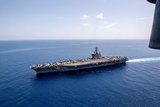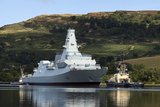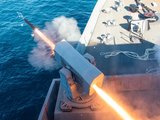Raytheon wins Ship Self-Defense System contract
Raytheon will continue the development, test and integration of the Ship Self-Defense System (SSDS) for the US Navy under a contract announced on 5 November. The $22.5 million will also see the company perform Platform Systems Engineering Agent (PSEA) services and support for fleet-deployed systems.
The SSDS is an open, distributed combat management system in service on carriers and amphibious ships in the US Navy fleet, including CVN, LSD dock landing ship, LPD, LHA and LHD classes. According to the company, the LHA variant is nearing initial deployment, a technical refresh of the LSD-class is almost complete, and system development is underway for the new CVN 78-class of aircraft carriers.
SSDS is designed to expedite the detect-to-engage sequence to defend against anti-ship cruise missiles. The system integrates and automates standalone sensors and weapon systems to provide the required, quick response and multi-target engagement capability.
Kevin Peppe, vice president of Seapower Capability Systems for Raytheon's Integrated Defense Systems business, said: ‘SSDS is a deployed and proven combat management system, delivering outstanding capabilities and performance as well as the reliability, refresh and the inherent interoperability benefits of an open architecture design.’
According to the company, Raytheon's SSDS MK 2 is the first fleet use of open architecture computing environment hardware and software that includes selected software components from the Total Ship Computing Environment Infrastructure developed for the DDG 1000-class destroyer. The open architecture design adds a new level of flexibility and commercial standards to support the navy's goal of open, modular and interoperable combat management systems for the fleet.
More from Naval Warfare
-
![UK ‘Hybrid Navy’ steps up as Norway cooperation reinforces Arctic strategy]()
UK ‘Hybrid Navy’ steps up as Norway cooperation reinforces Arctic strategy
As Russia commits billions to new warships and stealth submarines, the UK is reshaping its strategy with expanded troop deployments, shared frigate fleets and a shift towards uncrewed platforms.
-
![How the Hedge Strategy will impact the US Navy’s future capabilities]()
How the Hedge Strategy will impact the US Navy’s future capabilities
The US Navy Hedge Strategy is intended to provide a lethal, modular and cost-effective fleet while accepting Washington’s fiscal and industrial constraints.
-
![US Navy and Raytheon explore additional applications for Mk 58 CRAW torpedo]()
US Navy and Raytheon explore additional applications for Mk 58 CRAW torpedo
Designed as an anti-torpedo and anti-submarine capability, the USN and RTX foresee the Compact Rapid Attack Weapon’s potential for deployment from surface ships and aerial and uncrewed platforms.
-
![RTX Raytheon targets nearly 170% RAM production increase to meet global demand]()
RTX Raytheon targets nearly 170% RAM production increase to meet global demand
The US multinational company is currently assembling 300 Rolling Airframe Missile rounds per year, with plans to reach 800 units annually after significant investment and modernisation of its facilities.





















